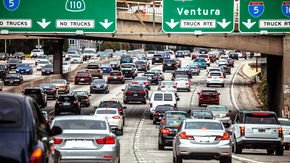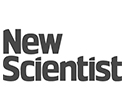Researchers not thrilled to see their work cited by Trump car mileage proposal

Originally published by E&E News
University of Washington, Seattle, engineering professor Julian Marshall was surprised to find his study cited in President Donald Trump’s administration’s proposal for revised clean car rules.
The proposal refers to Marshall’s 2008 study , “Environmental inequality: Air pollution exposures in California’s South Coast Air Basin,” which was published in the journal Atmospheric Environment .
“It was surprising to me that my work would be cited in a proposal to argue that we should loosen the standards,” Marshall told E&E News.
The Trump administration is arguing that freezing fuel economy targets at 2020 levels would have a negligible effect on air pollution. Its proposal says the freeze “would impact the global climate by 3/1000th of one degree Celsius by 2100.”
While Marshall's study wasn’t cited in order to support that conclusion, he nonetheless disagrees with it.
“When you look at the kinds of activities that take place under the Clean Air Act—and vehicle emissions standards are one part of that—cleaning up the air produces strong benefits for public health,” he said. “To be arguing we shouldn't be continuing to clean up the air, that’s just not consistent with the evidence.”
Marshall also noted that his study used private patient information. That means it wouldn’t pass muster under EPA’s “secret science” initiative, which would prevent the agency from using scientific studies in crafting new regulations unless the underlying data are made public.
Another researcher, who requested anonymity for fear of retaliation by his employer, also expressed surprise that his paper was cited.
“This is nuts,” the researcher said. “This contributed to declaring diesel exhaust a carcinogen.”
He added, “It’s best that this data not get analyzed by people with political axes to grind. You get really concerned when people with political axes to grind analyze something in order to find what they want to find.”
The proposal also cites a review by the Boston-based Health Effects Institute of hundreds of exposure, epidemiology and toxicology studies. The institute found a “sufficient” causal association between traffic-associated air pollution and childhood asthma.
Robert O’Keefe, the institute’s vice president, said the proposal accurately cites the nonprofit corporation’s work.
“Yes, the proposal cites HEI’s 2010 HEI Review of exposure to traffic related air pollution, which concluded among other things, that the scientific evidence was sufficient to support a causal association between traffic related air pollution and exacerbation of asthma in children,” O’Keefe said in an email.
He added, “Since it’s been over 10 years since the last review, HEI has recently brought together a new expert panel [to] review the most recent literature on exposure to traffic related air pollution and health and a large number of new studies, many of which use enhanced exposure metrics. Results are expected in early 2020.”
Reprinted from Greenwire with permission from E&E News. Copyright 2018. E&E provides essential news for energy and environment professionals at www.eenews.net
جدیدترین اخبار

